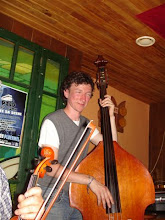 What a position: being an anthropology student. I initially took the opportunity to answer to our 'methods' research project request, as I had started to look more seriously upon the matter of Hungarian Roms, or Roms in Hungary - the gypsy population so often and so easily assimilated to the hungarian population from our western european point of view, but so easily rejected from their own...
What a position: being an anthropology student. I initially took the opportunity to answer to our 'methods' research project request, as I had started to look more seriously upon the matter of Hungarian Roms, or Roms in Hungary - the gypsy population so often and so easily assimilated to the hungarian population from our western european point of view, but so easily rejected from their own...My question was - and still is - addressing issues of identity, belonging, difference.
Who are Gypsies? (and who are the Roms for that matter - after all the officials have changed from Cigany to Romai in hungarian too) What do people think of them, how do they feel in relation to this "group of people"?
I chose to do this afternoon research in the form of an interview in a tube station in Budapest, knowing I could well be facing 'Roms' there myself. We came up to a cleaner, with Vica who was translating, and it turned out 'he was one' ("hat en vagyok egy."), said he coldly. But sadly enough he refused to engage in any conversation, mistaking our purposes...
Followed some very negative interviews which detailed the full stereotype of the gypsy family as dirty people without work, but with lots of dirty rude children. What was positive was that all of them stopped on the question of the Gypsy identity and none of them could say for sure what a "Rom" or "Gypsy" was, if there was even a difference.

After the Bun-sellers, came the woman in the bookshop, who started to show me some hungarian ethnologies on the Rom question, but I had to refuse them, unable to understand it effectively.
People in Hungary are quite conscious of the importance of the issue, and many things are done, whatever the general mentality. I finished that afternoon drinking a pint with a British school teacher in an Irish pub (watching a welsh rugby game on French Tv in central Budapest), and his situation and engagement was most interesting. He was involved in teaching english as a foreign language to kids, but in a school who gathers gypsy and 'other' children together in the same education. It's very interesting how he has to act differently with families for example, but also how some Roms thank him for his 'normal teaching'.
Some schools in hungary still have the division, but it turns out the country is far more supportive and open about the matter than other neighbouring eastern-european states, like Slovakia.

Then came the surprising encounter with a 'complex' homeless man, whom I will call Janos for the occasion, as I realised my head was fighting to avoid functionalising the poor man, and so in respect to his complexity, I will just leave the image to the reader.
His point of view on the Roms was, first of all - and in a very good english - that I shouldn't be asking people about this freely around town, as "an innocent tourist". Second he didn't 'make up his mind' about the question, but just told me he was mugged long time ago - before going to the street - and by some 'Gypsies', but also the first man who helped him do his builder's internship was a very hard-working Gypsy, or should I say Rom.
Rom seems a term to address to the good Roms, and Gypsies to the stealers and do-nothings...
Janos was more interested about my being here, and why the hell I would start such an enquiry, but he was very patient, and I found it impossible to summarize his opinion, or rather it was a rich one, from a man who, from what he told me, went to the street by choice.
His own life-story is another mystery, a spell he has been stroked by from the moment he chose his position homeless. Homeless is also harsh vocabulary, he said, as he has a home he went to, that of the open-space freedom, where his anarchist-type of thoughts lived.
His story and many others', what a passionate story it must be for a 'researcher' to pursue, and then there remains something about it anyway... A ghost of an answer to a ghost of a project.



No comments:
Post a Comment